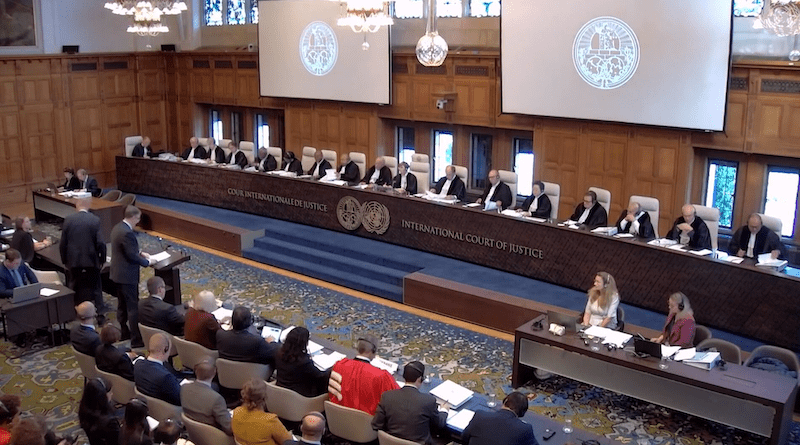Russia Urges UN Court To Dismiss Ukraine Genocide Case
By Milica Stojanovic
Russia’s legal team called on the International Court of Justice, the UN’s top court, on Monday to dismiss Kyiv’s case against Moscow claiming the false use of the Genocide Convention to justify the full-scale invasion of Ukraine in February 2022.
A Russian representative to the ICJ, Gennady Kuzmin, said at the beginning of hearing that Ukraine is not accusing Russia of committing genocide nor of failing to prevent or punish it.
“On the contrary, Ukraine insists no genocide has occurred,” Kuzmin said.
“That alone should be enough to reject the case. Because according to the court’s jurisprudence, if there was no genocide, there cannot be a violation of the Genocide Convention,” he added.
Ukraine accuses Russia of falsely interpreting the 1948 Convention on the Prevention and Punishment of the Crime of Genocide in order to support its arguments for an invasion.
At an ICJ hearing in the case in March 2022, Kyiv argued that Moscow falsely justified its case for the invasion by alleging that it needed to prevent and punish a ‘genocide’ of Russian speakers in the Russian-sponsored eastern rebel territories of Donetsk and Luhansk, which Russia now claims to have annexed. Kyiv insisted that there was no risk of genocide.
Russia refused to attend the hearings in The Hague and claimed that the court lacks the jurisdiction to hear the case, but the ICJ judges rejected this argument.
The ICJ then issued an order that Russia must halt its military operations in Ukraine at once, and that both sides in the war should refrain from further escalation.
Kuzmin told the ICJ on Monday that Ukraine is complaining about “Russia allegedly abusing the Genocide Convention as a pretext for recognising the independence of Donetsk and Lugansk People’s Republics and conducting a special military operation [Russia’s term for the full-scale invasion]”.
“It cannot be further from the truth. Firstly, it is a well-known fact that Russia launched the SMO under Article 51 of the UN Charter which provides the right of individual and collective self-defence, this right is not affected at all by the Genocide Convention,” he argued.
A member of the Russian legal team, Alfredo Crosato, claimed meanwhile that the Ukrainian case “confirms that the convention has been instrumentalised for a much broader and quite different dispute between the parties”.
Ukraine is due to respond on Tuesday and is expected to urge the ICJ judges to press ahead with the case against Russia.
Thirty-two Western countries have filed a declaration of intervention in the case and their representatives will be heard by the court on Wednesday. They are expected to back Ukraine’s arguments.
In parallel to the ICJ case, there are multiple international initiatives to probe and prosecute war crimes and aggression in Ukraine, including an investigation by prosecutors at the International Criminal Court, which issued an arrest warrant for Russian President Vladimir Putin in March.
On September 14, the Ukrainian Prosecutor-General’s Office said that the ICC had opened a field office in Kyiv to boost its investigations.
In July, the International Centre for the Prosecution of the Crime of Aggression against Ukraine, ICPA, a new legal body that will investigate crimes committed during the Russian invasion, was launched in The Hague.

